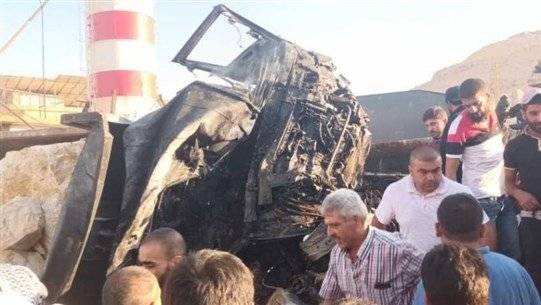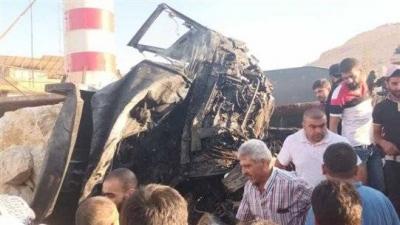Deb Mohammed Ghaddada and Youssef Al-Faliti were surely aware that their livelihoods and those of their families were steeped in hardship and toil in the highlands of Arsal. However, what they did not anticipate was that they would share a path to death and be buried in a single grave in their hometown of Arsal, mourning the loss of eight of its sons who were laid to rest yesterday in a large funeral. The only paved road in the highlands of Arsal, leading to the town through its cherry and apricot orchards and rock quarries, is the Akabat Al-Jurd road toward Wadi Ata. This rough road, referred to as "the only asphalted one," is used by the residents of Arsal, including farmers and quarry workers, to transport their harvests from the highlands to the town for market distribution.
Fate led Youssef Al-Faliti to finish harvesting his cherries and apricots with his family, which included his wife Fatouma Hussein Al-Faliti, their sons Baha and Mohammad, and daughters Huda and Nora along with his son-in-law Shihada Khaled Al-Faliti. He then headed back home from his orchard in the highlands using his pickup truck via the paved Akabat Al-Jurd road.
Deb Mohammed Ghaddada, a thirty-something father of seven with his eldest being 11, also finished loading rocks from one of the town's quarries and headed toward the same route, Akabat Al-Jurd - Wadi Ata, following the usual practice of truck drivers. However, Ghaddada lost control of his truck, colliding with Youssef Al-Faliti's pickup truck before crashing into a water well building in the town, which has a large tank and concrete support walls that have been in place since the 1980s.
The disaster was significant; Al-Faliti, along with his family members and son-in-law, died (while two daughters who were absent survived), and Ghaddada was injured and taken to Al-Rahma Hospital, where his condition required him to be transported to Al-Jaytawi Hospital due to severe burns. However, this did not happen, and he was neither admitted nor seen in the emergency room, according to a statement from MP Melhem Al-Hajiri, who called for a "quick investigation into Al-Jaytawi Hospital's management for failing to admit an injured person in critical condition even to the emergency room," stressing that "the hospital's behavior is irresponsible and devoid of the simplest humanitarian and ethical duties and warrants accountability for those reckless with people's lives."
### Unpaved Roads
The neglect that the town has been experiencing, hosting more than double its original population of displaced persons for over a decade, is the same neglect that saw officials swarming in morning and evening with promises of development and services before it was liberated from terrorist and extremist groups. The vast area of the town, located in the eastern mountain range at the country's borders, lacks a paved road connecting it to the upper and middle highlands, save for the Akabat Al-Mbeidah - Akabat Al-Jurd - Wadi Ata route. It is noted that there are other roads that could be useful if paved, such as the Wadi Hamid, Wadi Al-Zaarour, and Wadi Al-Raiyan routes, but all are not passable due to their roughness, and residents and Syrians avoid them.
Arsal’s Mayor Basile Al-Hajiri confirmed to "An-Nahar" that there are less dangerous roads in Arsal that are not used due to a lack of government attention. He explained that he requested yesterday from the military to close the Akabat Al-Jurd - Wadi Ata road to large vehicles following the incident, aiming to divert vehicles to other unpaved roads to reduce the risks faced by the people of Arsal.
### Risks of Working with Stone
The dangers faced by the people of Arsal are not limited to the roads; there are also risks in the stone sector itself. Arsal loses some of its residents to various accidental fatalities, as Rima Kerenbi, a member of the Arsal municipal council, affirms to "An-Nahar". Kerenbi points out the significance of decorative stone in Arsal's economy, providing job opportunities for hundreds of families. She does not hide that the sector suffered significant damage during the events that took place in Arsal’s highlands, followed by the fuel crisis that crippled the entire sector, reducing its establishments from 600 working in decorative stone—from quarries through workshops to sawmills—to about a quarter of that.
Each establishment employs an average of 6 to 7 workers, in addition to the owners of the sawmills or quarries, while the danger lies in the fact that this work requires "awareness and knowledge and precautionary measures that are nearly non-existent," especially since rock blasting operations lead to injuries among several workers in their eyes and bodies due to a lack of precautions. Additionally, some individuals dealing with sawmills have suffered injuries resulting in lost hands or fingers. Furthermore, the dangers posed by "Kamakha" pits (ponds of dust and water accumulating from the effects of stone cutting works in open pits, resembling sticky quicksand), lack proper fencing or safety measures, and they have been the site of drownings, including children and workers while cleaning them.
Kerenbi affirms that Arsal has "lost several of its residents over the years due to these pits, and we have asked sawmill owners to build walls around these pits, yet no one has complied." She insists on the necessity of "self-awareness" among sawmill and quarry owners and truck drivers, as well as regular equipment inspections to avoid losing drivers or civilians as happened the day before yesterday.
If there is someone responsible for the Arsal disaster, it is the state due to its neglect of even the most basic developmental services, and it must assume responsibility for its citizens concerning paving the roads used daily by its citizens and army. Moreover, it must revive inspections of vehicles and cars to ensure public safety for everyone, along with effective health monitoring and oversight of hospitals, especially regarding citizens dying at their doors!




